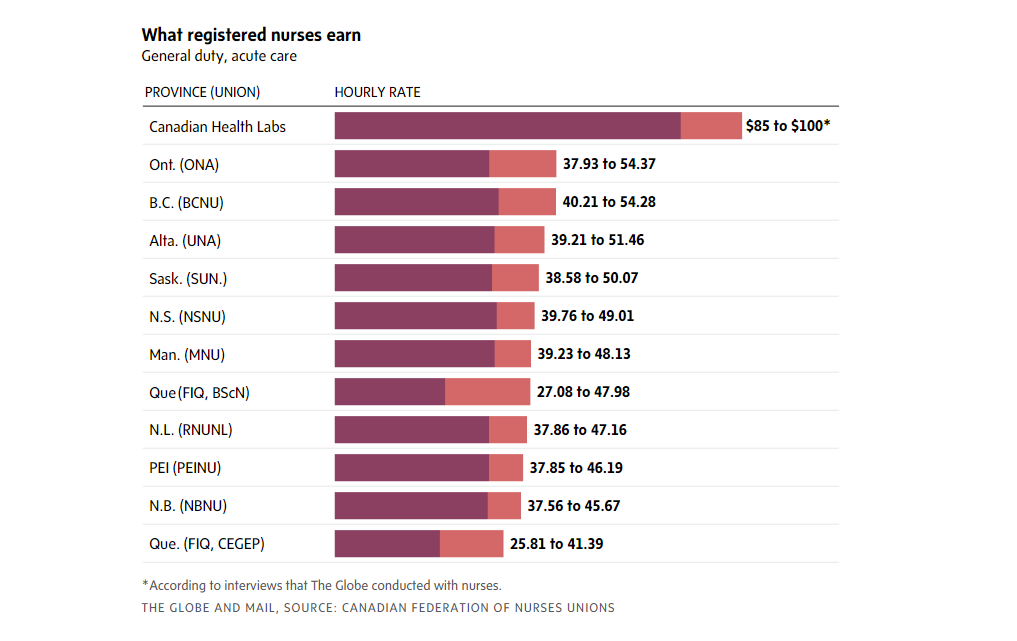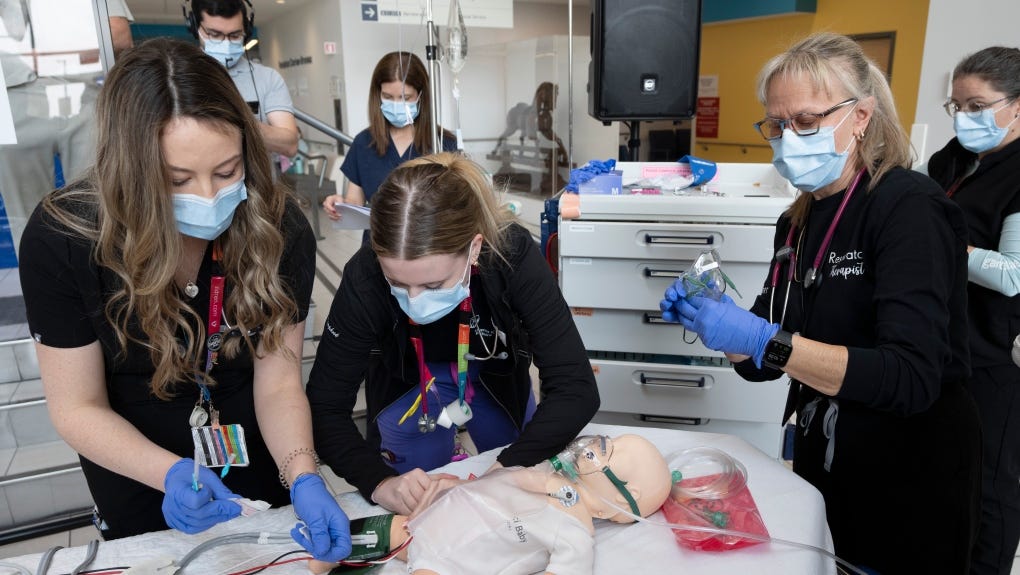You’re reading the web version of The Weekly Dose, our newsletter on health care and medical news. Sign up to get it next Sunday.
Hello, Healthwatchers! 👋
This week's edition is full of insights into some of the pressing challenges (and solutions) in Canadian healthcare. I’ll aim to add to your understanding of the impacts of policies on patient care and the health workforce, and hopefully we’ll all come away a bit more knowledgeable and prepared for the week ahead. Let’s begin.
How Canadian hospitals grew dependent on expensive agency nurses
A Globe investigation reveals the heavy systemic costs of hospitals’ increased reliance on private nursing agencies, with hourly rates up to 6x higher than staff nurses' earnings.
Why it's important: While agencies are useful during critical staffing crunches, their prolonged and routinized use raises serious questions about the sustainability of healthcare delivery.
In the face of health staffing shortages across Canada, private nursing agencies have stepped in, offering immediate relief, but at steep costs. While these services have been crucial in maintaining hospital operations in Atlantic provinces—particularly in remote areas—their contracts demand payments many times higher than typical nursing salaries, placing significant strain on hospital and provincial health budgets. The Globe uncovered some noteworthy costs to taxpayers: nursing certification classes, a $312 cab ride, furniture, pet transportation, and an air fryer. In another case, the company billed taxpayers $1.6-million in meal allowances for nurses, though there is no evidence that this money was ever distributed to nurses.
Read more…
Virtual health’s hidden cost: when we’re the product
As virtual health becomes a staple, concerns arise over the commercial uses of sensitive personal health information by for-profit platforms, often without patient knowledge.
Why it's important: The rapid expansion of virtual care has led to some questionable uses of patient data, not just for care but for profit maximization through targeted advertising and pharma partnerships.
Patient data, including personal and health information, is being mined and monetized by virtual care companies in ways that raise significant ethical and privacy concerns. Platforms use this data to display targeted ads, upsell higher-priced private services, and even manipulate care pathways through A/B testing to favour pharmaceutical partners. These manipulations often occur without patient consent or awareness, leveraging the healthcare system's inherent trust. As virtual care solidifies its role in healthcare delivery, understanding and regulating these practices is going to be imperative for policymakers. If that’s you, make sure you read this article.
Read more…
Rural doctors and nurses catch big breaks on student debt
The federal government announced a 50% increase in student loan forgiveness for medical professionals in rural areas, aiming to address shortages by offering up to $60,000 for doctors and $30,000 for nurses.
Why it's important: It’s a strategic and pragmatic move that aims to directly alleviate the critical shortage of providers in under-served communities across Canada. It’s also a rare chance for me to talk about some good news. I’ll take it.
By significantly increasing the loan forgiveness amount, the initiative is seeking to attract nearly 1,200 doctors and 4,000 nurses over the next 10 years, potentially benefiting up to 8,000 medical professionals annually by 2033. This effort reflects a broader commitment from the feds to enhance healthcare accessibility in remote areas, ideally making sure residents receive necessary medical care without the need to travel long distances. We probably won’t see the impacts until a few years from now, but it's definitely a promising step towards closing the rural healthcare gap.
Read more…
Confirmed measles in Toronto infant spurs Public Health into action
Toronto Public Health is investigating after an infant, recently traveled, has been hospitalized with measles, marking a concerning addition to cases in the GTA.
Why it's important: This recent measles case in Toronto emphasizes the critical importance of vaccination and vigilance against highly contagious (and consequential) diseases.
With measles being airborne and able to spread extremely rapidly among unvaccinated populations, this and other cases highlight the global nature of infectious diseases and the ease with which pathogens can cross borders in the setting of unrestricted travel. Dr. Vinita Dubey's advice to ensure vaccination and immunity before travel is timely and wise. As measles ramps up globally, the case is a reminder of the continuous threat posed by vaccine-preventable diseases and the need for community-wide participation in vaccination programs to safeguard public health. Unfortunately, it is also likely a harbinger of more to come.
Read more…
Exclusive pharmacy–insurer deals are becoming more common, sparking concern
To manage escalating prescription drug costs, Canadian insurers are increasingly securing exclusive agreements with pharmacies and drug suppliers.
Why it's important: Preferred Pharmacy Networks (PPNs), promise premium savings by directing plan members to specific pharmacies. These deals aim to contain benefit premiums by leveraging bulk purchasing, but have ignited concern over patient access and fairness to independent pharmacies.
While proponents argue these deals ensure cost-efficiency, critics warn of compromised patient choice and the marginalization of small, local pharmacies. The emergence of PPNs in Canada signals a shift towards American-style healthcare management, prioritizing cost savings over patient choice and care continuity. The trend not only restricts patient autonomy but also raises questions about the future of small, independent pharmacies in a landscape increasingly dominated by large chains and their interests.
Read more…
Bill 124 Fallout: Ford Government faces billions in backpay
Premier Ford acknowledged the provincial government has spent billions of dollars on compensation for unionized health workers due to the now-overturned wage cap imposed by Bill 124.
Why it's important: The 2019 law, aimed at curbing public sector expenses by limiting wage increases to 1% annually, was (again) deemed unconstitutional this week. The province is now committed to repealing its law and begins to negotiate backpay for affected workers, including nurses and medical residents.
While Ford emphasizes the importance of governmental decision-making in wage matters, he respects the court's ruling, signaling a pivot in approach. The Financial Accountability Office estimates a $13.7 billion payout in wage adjustments. Bill 124’s hidden toll: widespread demoralization of nurses, leading to burnout for many, and for others—bringing today’s newsletter full-circle—an impetus to take on new roles at private staffing agencies as a way to boost salaries in a manner that has kept pace with inflation.
Read more…
That wraps up this week's dive into Canadian healthcare. Thanks as always, for joining me through its many twists and turns. Your thoughts and perspectives on these topics are what keep this train moving. Keep questioning, keep discussing, and see you next week for more insights and updates.
Yours in health,
Nick Tsergas
National Health News Editor
Canada Healthwatch
[email protected] | canadahealthwatch.ca





